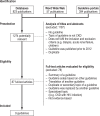The Management of Non-Dialysis-Dependent Chronic Kidney Disease in Primary Care
- PMID: 33439824
- PMCID: PMC7878722
- DOI: 10.3238/arztebl.2020.0745
The Management of Non-Dialysis-Dependent Chronic Kidney Disease in Primary Care
Abstract
Background: Approximately 10% of adults in Germany have chronic kidney disease (CKD). The prevalence of CKD among patients being cared for by general practitioners is approximately 30%, and its prevalence in nursing homes is over 50%. An S3 guideline has been developed for the management of CKD in primary care.
Methods: The guideline is based on publications retrieved by a systematic search of the literature for international guidelines published in the period 2013-2017, and additional searches on specific questions. It was created by the German College of General Practitioners and Family Physicians (Deutsche Gesellschaft für Allgemeinmedizin und Familienmedizin, DEGAM) and consented with the German Societies of Nephrology and Internal Medicine (DGfN, DGIM) and patient representation.
Results: Upon the initial diagnosis of CKD (glomerular filtration rate [GFR] <60 mL/ min), the patient's blood pressure and urinary albumin-to-creatinine ratio (ACR) should be measured, and the urine should be examined for hematuria. Monitoring intervals are determined on an individual basis depending on the stage of disease and the patient's general state of health and personal preferences. Nephrological consultation should be obtained if the GFR is less than 30 mL/min, if CKD is initially diagnosed (GFR 30-59 mL/min) in the presence of persistent hematuria without any urological explanation or of albinuria in stage A2 or higher, if the patient has refractory hypertension requiring three or more antihypertensive drugs, or if the renal disease is rapidly progressive. The threshold for referring a patient should be kept low for persons under age 50; persons over age 70 should be referred only if warranted in consideration of their comorbidities and individual health goals.
Conclusion: The main elements of the treatment of CKD are the treatment of hypertension and diabetes and the modification of lifestyle factors. An innovation from the primary care practioner's perspective is the assessment of albuminuria with the albumin-to-creatinine ratio.
Figures


References
-
- Levey AS, de Jong PE, Coresh J, et al. The definition, classification, and prognosis of chronic kidney disease: a KDIGO Controversies Conference report. Kidney Int. 2011;80:17–28. - PubMed
-
- Stel VS, Brück K, Fraser S, et al. International differences in chronic kidney disease prevalence: a key public health and epidemiologic research issue. Nephrol Dial Transplant. 2017;32(Suppl 2):ii129–ii135. - PubMed
MeSH terms
LinkOut - more resources
Full Text Sources
Medical

